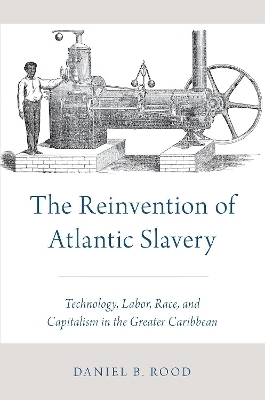
The Reinvention of Atlantic Slavery
Oxford University Press Inc (Verlag)
978-0-19-752842-6 (ISBN)
The period of the "second slavery" was marked by geographic expansion of zones of slavery into the Upper US South, Cuba, and Brazil and chronological expansion into the industrial age.As The Reinvention of Atlantic Slavery shows, ambitious planters throughout the Greater Caribbean hired a transnational group of chemists, engineers, and other "plantation experts" to assist them in adapting industrial technologies to suit their "tropical" needs and increase profitability. Not only were technologies reinvented so as to keep manufacturing processes local but slaveholders' adaptation of new racial ideologies also shaped their particular usage of new machines. Finally, these businessmen forged a new set of relationships with one another in order to sidestep the financial dominance of Great Britain and the northeastern United States.
In addition to promoting new forms of mechanization, the technical experts depended on the know-how of slaves alongside whom they worked. Bondspeople with industrial craft skills played key roles in the development of new production processes and technologies like sugar mills. While the very existence of such skilled slaves contradicted prevailing racial ideologies and allowed black people to wield power in their own interest, their contributions grew the slave economies of Cuba, Brazil, and the Upper South. Together reform-minded planters, technical experts, and enslaved people modernized sugar plantations in Louisiana and Cuba; brought together rural Virginia wheat planters and industrial flour-millers in Richmond with the coffee-planting system of southeastern Brazil; and enabled engineers and iron-makers in Virginia to collaborate with railroad and sugar entrepreneurs in Cuba.
Through his examination of the creation of these industrial bodies of knowledge, Daniel B. Rood demonstrates the deepening dependence of the Atlantic economy on forced labor after a few revolutionary decades in which it seemed the institution of slavery might be destroyed. The reinvention of this plantation world in the 1840s and 1850s brought a renewed movement in the 1860s, especially from enslaved people themselves in the United States and Cuba, to end chattel slavery.
This account of capitalism, technology, and slavery offers new perspectives on the nineteenth-century Americas.
Daniel B. Rood is associate professor of history at the University of Georgia. He is the coeditor of Global Scientific Practice in the Age of Revolutions, 1750-1850.
Acknowledgments
Introduction: Atlantic Inversions
Ch. 1: A Creole Industrial Revolution in the Cuban Sugar Mill
Ch. 2: "El Principio Sacarino": Purity, Equilibrium, and Whiteness in the Sugar Mill
Ch. 3: From an Infrastructure of Fees to an Infrastructure of Flows: The Warehouse Revolution in Havana Harbor
Ch. 4: Wrought-Iron Politics: Racial Knowledge in the Making of a Greater Caribbean Railroad Industry
Ch. 5: Sweetness and Debasement: Flour and Coffee in the Richmond-Rio Circuit
Ch. 6: Entangled Technologies: Richmond and the Transformation of American Flour Milling
Ch. 7: An International Harvest: The Development of the McCormick Reaper
Epilogue: Futures of Racial Capitalism
Notes
Index
| Erscheinungsdatum | 07.05.2020 |
|---|---|
| Zusatzinfo | 33 hts |
| Verlagsort | New York |
| Sprache | englisch |
| Maße | 155 x 231 mm |
| Gewicht | 431 g |
| Themenwelt | Geschichte ► Allgemeine Geschichte ► Neuzeit (bis 1918) |
| Geisteswissenschaften ► Geschichte ► Regional- / Ländergeschichte | |
| ISBN-10 | 0-19-752842-2 / 0197528422 |
| ISBN-13 | 978-0-19-752842-6 / 9780197528426 |
| Zustand | Neuware |
| Haben Sie eine Frage zum Produkt? |
aus dem Bereich


